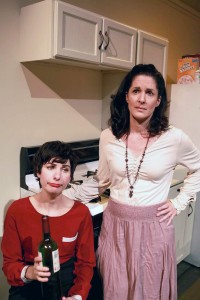Bells rings in with humor and heart
Perhaps it wasn’t in the stars for a quasi-Buffy the Vampire Slayer reunion to happen.

Sister act · Dagney Kerr (left) plays Maxine, the picture-perfect sister of Molly (Cameryon Meyer, right) in The Bells of West 87th Street. – Courtesy of Marla Halac
Juliet Landau and James Marsters, who played the infamous vampire pair Drusilla and Spike in Joss Whedon’s acclaimed series were set to reunite as a different kind of romantic duo for the world premiere of The Bells of West 87th at the Greenway Court Theater on Fairfax Avenue on Saturday. Unfortunately, only a few days ago, Landau was forced to step aside from the role of the lead character, Molly Fein, because of scheduling conflicts, and Cameron Meyer (Three Sisters at the Odyssey and Cold/Tender) stepped in to the role.
Though it would have been thrilling to see Landau and Marsters reunite, Meyer in the lead role gave Bells the opportunity to show that the script could stand firmly on its own two legs — even without Landau and Marsters’ chemistry. In fact, the show, written by Elin Hampton (Dream On, Mad About You, Buffy the Vampire Slayer), manages to reach an almost pitch perfect comedic pace at times, as it chronicles the life of Molly, a 40-year-old building manager and amateur poet who is trying to finally break away from her neurotic, dysfunctional family.
Hampton’s Woody Allen-esque comedy is set on the Upper West Side of New York, in two adjacent apartments. Molly lives in one, her father, the other. But Molly doesn’t live alone — her overbearing mother, Ida (played brilliantly by Carol Locatell, who captures the essence of the little old Jewish lady), has been secretly living with Molly rather than with Molly’s perfect sister, Maxine (another Buffy alum, Dagney Kerr, who makes an impact, despite less stage time) on Staten Island where she is supposed to be. (Bells loves to use real estate to establish personalities.)
Though Ida has been separated from her father, Eli (played by the hilarious, bathrobe-wearing Robert Towers), for years, she finds herself most comfortable with the overly amenable (read: doormat) daughter Molly and also, though she might deny it, she finds comfort in keeping track of her husband’s movements.
One might wonder how Eli has not discovered she is living next door, but Ida has a system for that: Eli is hard of hearing and she has hung bells all over the windows and doors of his apartment to hear when he is coming and going.
Molly has a secret of her own that she has been keeping from her family: She has been seeing someone on the sly, a man she met at a night poetry class named Chris Germain (played by Marsters, who falls into the character of the loveable, clueless poet with an effortlessness that is enviable). Tonight is the night that Molly is finally going to introduce him to her family when he comes over for dinner.
All of the pieces have been set in place for an explosive evening and half the fun is watching it unfold. The jokes never stop coming and the constant chime of the bells add to the campy element of the play.
When the situations just become too much for Molly, the play suddenly freezes and Molly steps to the front, a blue light on her, and lets loose her angsty poetry, spitting out verbs and adjectives with comical vitriol. Meyer is best in these asides. As she was the last to join the cast, it is to be expected that there are moments where her character does not feel as established as the others. She still manages to hold her own amongst the other actors though, and in these moments, especially, the character feels more hers.
It is easy to imagine that much of the laughter from the audience comes because they can easily identify with these dysfunctional characters. Who hasn’t had an overbearing parent, a perfect sister or a clueless boyfriend? Sometimes these characters don’t even feel like ideas but like real people who very easily could be sitting across the street, munching on a corned beef sandwich at Canters.
There are times where the jokes might go a little too far (for example when Molly talks about moving out and living her own life, her mother says: “Anne Frank never left her attic”). But the play’s ability to not hold back is also what makes it so relatable, so personal. There is always at least one family member who isn’t politically incorrect, who might actually say that.
The play’s tagline is: “Normal is what people call families that aren’t theirs,” and that is essentially what Bells is trying to show. Every family is weird; some, like Molly’s, are more so than others. But what’s the use in striving for normal? Rather, one must accept their family for what they are and then live their own life. Between the jokes and the drama, Bells somehow manages to make this theme hit home. For Buffy fans out there: the performance was “five by five.”
The Bells of West 87th Street runs weekends through Oct. 13 at the Greenway Court Theatre.
